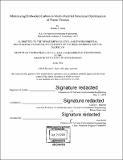Minimizing embodied carbon in multi-material structural optimization of planar trusses
Author(s)
Stern, Brenda G
DownloadFull printable version (9.535Mb)
Other Contributors
Massachusetts Institute of Technology. Department of Civil and Environmental Engineering.
Advisor
Caitlin T. Mueller.
Terms of use
Metadata
Show full item recordAbstract
In the built environment, there is a growing emphasis on sustainable, energy efficient design that reduces carbon emissions. However, until recently, most efforts have focused only on reducing operational carbon [1]. As a result, the carbon embodied in construction materials, especially in a building's structural system, is becoming a larger contributor to the total carbon impacts of a building. Material type and quantity are important in determining the extent of this contribution because both will affect the amount of carbon emitted from the material production. For example, two common materials for truss structures are timber and steel. While timber's embodied carbon coefficient (kg[subscript CO2e]/kg[subscript material]) and density are lower than that of steel, its much lower strength means that it may not always result in the least-emitting structural design. As a result, the choice of the more sustainable material for any given member is dependent on factors such as the truss span or shape. Multi-material structures offer a solution to create efficient structures with a lower environmental impact. In this thesis, an embodied carbon optimization investigates truss structures of various spans and studies how multi-material and single-material designs compare. This research introduces a new approach for multi-material designs for the optimization of embodied carbon and demonstrates the advantages of using structural optimization and multi-material designs for sustainability. Keywords.: Optimization, embodied carbon, sustainable structures, truss structures
Description
Thesis: M. Eng., Massachusetts Institute of Technology, Department of Civil and Environmental Engineering, 2018. Cataloged from PDF version of thesis. Includes bibliographical references (pages 55-56).
Date issued
2018Department
Massachusetts Institute of Technology. Department of Civil and Environmental EngineeringPublisher
Massachusetts Institute of Technology
Keywords
Civil and Environmental Engineering.